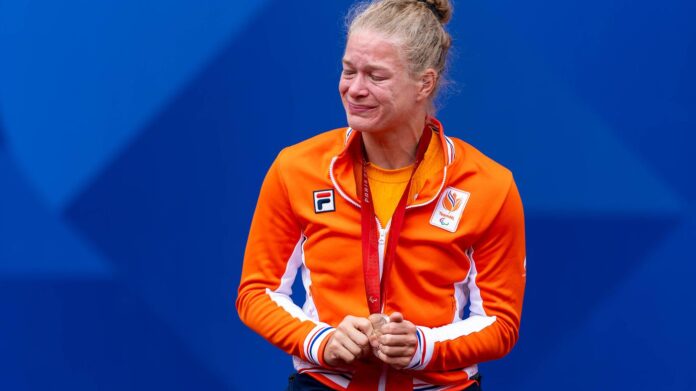When the world number one loses to the number two, it’s not really a sensation. Actually.
But if the loser is called Diede de Groot, is the defending champion, has won 15 Grand Slams in a row and her home country, the Netherlands, is the world’s leading player in women’s wheelchair tennis at Paralympic Games has won gold every time so far, then you could probably call it a sensation.
The world number two who will be making sure of this on Friday afternoon is the 30-year-old Japanese Yui Kamiji. On the main court in the Roland Garros tennis temple, it became clear early on in the final on Friday that a surprise could be possible. De Groot fell behind, and avoidable mistakes repeatedly proved to be her undoing. Nevertheless, the Dutchwoman, who last won Wimbledon in July, fought back and won the set 6:4.
In the second set again: mistakes that de Groot really shouldn’t have made and that normally don’t. She plays seemingly simple balls into the net, giving the Japanese player numerous points. When the score is 5:3 for Kamiji, de Groot is serving. Double fault. The set goes to the Japanese player 6:3.

© REUTERS/Carlos Garcia Rawlins
Although de Groot is certainly not at her best and has a more than worthy opponent in the world number two, she is playing great tennis at times. The thousands of spectators at Court Philippe-Chatrier are treated to a match of the highest tension. And it is set to be really nerve-racking at the end.
Repetition of the previous day
In the last set, Kamiji is two points away from victory at 5:3. The stadium is completely silent, but the tension is deafening. But de Groot remains unimpressed and gets back to 4:5. A little later: three match points, or gold medal points, for Kamiji. De Groot is able to score again after a long rally. Then, on de Groot’s serve, there is a scene that is emblematic of her performance in the final in Paris. Double fault. Gold for Kamiji.
The Japanese woman is the first non-Dutch woman to ever win a Paralympic gold medal in wheelchair tennis. De Groot takes silver. It is almost a repeat of the previous day, when the Dutch top favorites de Groot and Aniek van Koot lost in the doubles final against Kamiji and her partner Manami Tanaka 6:4, 6:7, and 8:10 in the decisive tiebreak.
The Dutch dominance in women’s singles and doubles, which had been unshakable since tennis was included in the Paralympic program in 1992, was broken. This was an unusual feeling, especially for de Groot, with her Grand Slam winning streak. With her victory in Wimbledon, she celebrated her 23rd Grand Slam title. One less than Novak Djokovic, who, however, has only won four – not 15 – titles in a row.
Since June 2018, de Groot has held the world number one position without interruption and has broken numerous records. The Dutchwoman had already won gold in singles against Kamiji at the 2021 Paralympics. At that time, de Groot crowned herself with a “Golden Slam” at the end of the year. This prestigious success includes winning all four Grand Slam tournaments within one year and the gold medal at the Paralympics. It is one of the rarest achievements in tennis. Only Steffi Graf achieved this success in 1988, before de Groot celebrated the first “Golden Slams” in wheelchair tennis in 2021 together with quad tennis player Dylan Alcott.
Differences in wheelchair tennis are huge
The level at which Diede de Groot plays was also evident to Katharina Krüger at the Paralympics. In the first round, the only German participant had to admit defeat with 1:6 and 0:6. “I know the demonstration of power from my entire career,” she said after her first-round exit: “The Dutch always produce outstanding talent.” Three of the top four in the world rankings come from the Netherlands.
Krüger attributes the difference mainly to the system in the Netherlands: “There are full-time coaches and support programs that work specifically with schools and clinics to attract young talent.” Her coach Niklas Höfken adds: “The Dutch Tennis Association has developed a system for many years that supports wheelchair tennis extremely well, both financially and in terms of personnel.” In Germany, there is often only a part-time professional system. “The Dutch players can concentrate fully on tennis,” says Krüger. She, on the other hand, works 30 hours a week on the side.
The level at the top is getting tighter
But the German tennis player, who has been a top ten player for many years, notices that the situation is changing: “In recent years, more and more strong players from Asia have joined the ranks.” She has the feeling that the Dutch players are no longer the undisputed power they once were. “They no longer always win,” says Krüger.
World number three Aniek van Koot shares this assessment: “I believe that our competitors are getting stronger.” Wheelchair tennis is growing and other countries are also developing. “Everyone is raising their level, so we have been warned.” A warning that perhaps came too late.
